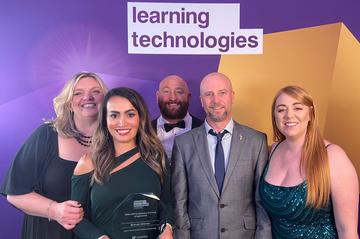Opportunities and Progression for Conveyancing Career Paths
Wed 14 Aug 2024

Michelle Timms
Product Manager / Property Law Tutor
When buying a new property, conveyancing is a pivotal aspect of property transactions, involving the legal transfer of property ownership.
It involves overseeing the legal transfer of property ownership, ensuring transactions are conducted smoothly and in accordance with legal requirements.
The role demands meticulous attention to detail, a solid grasp of property law, and excellent communication skills – but with an average base salary of over £30,000, it’s worth the challenge!
As a conveyancer, you play a crucial role in facilitating property transactions, making it a rewarding choice for those passionate about law, property, and client service.
This blog will explore the various career paths within conveyancing and highlight opportunities for progression, with insight on how a conveyancing course from MOL will help you get started.
Exploring conveyancing career paths
As a conveyancer, your primary role is to oversee property transactions, handling legal documents, conducting searches, and ensuring all aspects of the process comply with regulations.
To enter this field, you typically need a solid understanding of property law and conveyancing procedures. This is what all your decisions and actions as a conveyancer are based on, to safeguard the interests of all parties involved in property transactions.
Our comprehensive conveyancing courses cover all the fundamental aspects of property law and conveyancing procedures, also integrating practical knowledge and real-world scenarios to enhance your understanding and preparedness.
With us, you’ll be equipped with the necessary skills and qualifications you’ll need to achieve success as a conveyancer!
Specialising in conveyancing
Within conveyancing, there are several specialised areas you can focus on, such as residential, commercial, or agricultural conveyancing.
Each specialisation has its own challenges and opportunities for career growth; by choosing a specific area, you can develop expertise that sets you apart in the field, focusing on a particular type of property transaction.
How can you specialise as a conveyancer?
- Residential conveyancing: Handling the legal aspects of residential property transactions, including buying, selling, and remortgaging homes
- Commercial conveyancing: Dealing with the legal complexities of commercial property transactions, such as office buildings, retail spaces, and industrial properties
- Agricultural conveyancing: Specialising in the legal aspects of agricultural land transactions, including farms, estates, and rural properties
- Leasehold conveyancing: Managing the legalities surrounding leasehold properties, including lease extensions, renewals, and leasehold enfranchisement
- New build conveyancing: Focusing on legal processes specific to newly built properties, including liaising with developers, handling warranties, and ensuring compliance with building regulations.
At MOL, we recognise the importance of these specialisations - that’s why our licensed conveyancing courses are designed to meet the unique demands of each.
Whether you're interested in residential properties, commercial deals, or agricultural land, our training equips you with the specialised knowledge and practical skills to excel in your chosen area of the conveyancing industry.
How to progress as a conveyancer
Advancing in conveyancing offers paths from senior roles to management or consultancy, requiring ongoing learning to stay competitive amid evolving property laws.
This involves updating legal knowledge, refining negotiation skills, and adopting new technologies.
Continuous professional development enhances expertise, improves client service, and prepares conveyancers for leadership and consultancy roles, ensuring that you’ll excel in a dynamic market and deliver superior results.
Career progression opportunities in conveyancing
- Senior Conveyancer: Advancing to a senior role where you oversee more complex transactions, mentor junior staff, and take on greater responsibility in client management
- Team Leader or Manager: Moving into a managerial position where you lead a team of conveyancers, manage workflows, and ensure operational efficiency within a conveyancing department
- Specialist Consultant: Becoming a specialist consultant advising on intricate legal issues within specific areas like commercial property, leasehold transactions, or new builds
- Business Development: Transitioning into business development roles where you focus on expanding client networks, developing new business opportunities, and enhancing the firm's market presence
- Legal Compliance and Risk Management: Specialising in ensuring legal compliance, managing risks associated with property transactions, and implementing best practices within conveyancing processes
- Further Education and Academia: Pursuing further education to become an expert in property law, teaching aspiring conveyancers, or contributing to industry research and policy development.
Begin your conveyancing career path with MOL
Conveyancing offers diverse career paths and ample opportunities for progression, but whether you're starting your journey or looking to advance, understanding these paths and investing in the right training is key to a successful career in conveyancing.
MOL's courses empower you to achieve your career goals and excel as a skilled conveyancer. MOL equips you with essential skills in property law, conveyancing procedures, and practical applications through hands-on learning and expert guidance.
Gain the confidence and expertise needed to navigate complex property transactions efficiently and deliver exceptional service in this dynamic field; explore MOL’s conveyancing courses and enrol today!

Licensed Conveyancing
Qualifications
We’re proud to offer nationally recognised SQA qualifications in Licensed Conveyancing.




